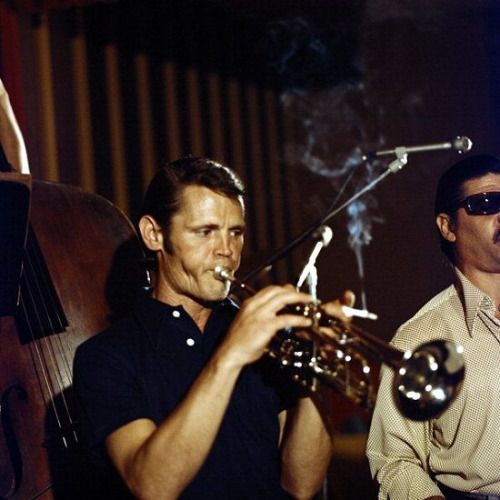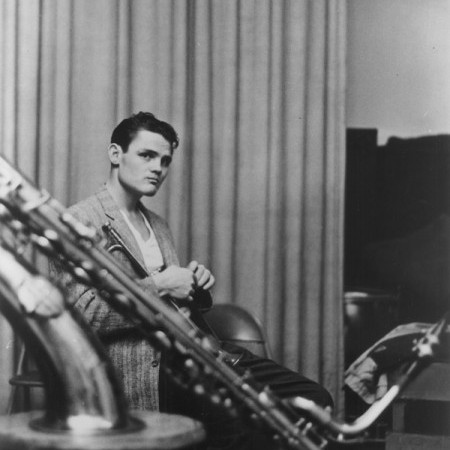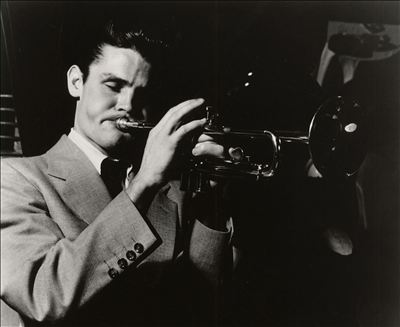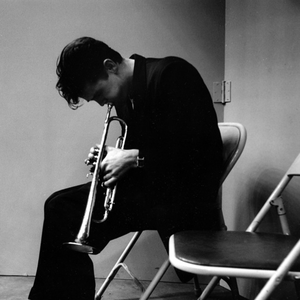
The Tragic Tale of Chet Baker a Jazz Legend
Chet Baker, a jazz great, is remembered for his extraordinary talent as both a trumpet player and a vocalist. Baker, who was born in 1929 in Yale, Oklahoma, rose to prominence as a jazz musician throughout the 1950s. His fascinating performances and distinct approach on the trumpet charmed audiences worldwide, gaining him a cult following among jazz fans.
Baker's musical approach was distinguished by poetic phrasing, delicate tone, and expressive emotion. He had an extraordinary capacity to portray a wide spectrum of emotions through his trumpet playing, enthralling audiences with his thoughtful and emotional performances. His vocals were equally fascinating, with a delicate and intimate tone that added to his musical attractiveness.

Chet Baker collaborated with several jazz greats over his career, including Charlie Parker, Gerry Mulligan, and Stan Getz, making an everlasting influence on the jazz landscape. His contributions to the West Coast jazz movement, as well as his exploration of the cool jazz and bebop genres, demonstrated his artist's versatility.
Chet Baker's personal life was terrible, despite his artistic ability. Addiction and substance abuse issues plagued him throughout his career, causing legal problems and emotional strife. The combination of his ability and personal issues resulted in a complicated and compelling legacy, making him an enigma in the world of jazz.
This article delves into the tragic tale of Chet Baker, exploring the highs and lows of his life and career, and the lasting impact he had on the world of jazz.
Early Life and Rise to Fame
Chet Baker's upbringing and early musical influences played a significant role in shaping his trajectory as a jazz musician. Born on December 23, 1929, in Yale, Oklahoma, Baker grew up in a musical household. His father, Chesney Baker Sr., was a talented guitarist, and his mother, Vera Baker, played piano. Their love for music nurtured young Chet's passion and set the foundation for his musical journey.

Chet Baker Musical Education
Baker's early musical education began with the piano, which he started playing at the age of 10. However, his focus would soon shift to the trumpet. At the age of 13, Baker received his first trumpet and began taking lessons. His natural talent and dedication quickly became evident as he progressed rapidly.
As a teenager, Baker's musical influences began to take shape. He listened avidly to recordings of prominent jazz trumpet players such as Roy Eldridge, Louis Armstrong, and Harry James. These musicians inspired and influenced Baker's early trumpet style, providing him with a rich palette of sounds and techniques to draw from.
Breakthrough as a Jazz Musician and his rise to fame in the 1950s.
In the early 1950s, Baker's talent caught the attention of fellow jazz musician Charlie Parker. Parker invited Baker to join his band, providing him with a significant opportunity to showcase his skills alongside some of the jazz greats of the time. This experience proved pivotal in launching Baker's career and solidifying his reputation as an emerging jazz talent.
Another significant turning point came when Baker crossed paths with baritone saxophonist Gerry Mulligan. Together, they formed the Gerry Mulligan Quartet, which became highly influential in the West Coast jazz movement. The quartet's relaxed, melodic style, characterized by Baker's lyrical trumpet and Mulligan's smooth saxophone, gained popularity and helped define the West Coast jazz sound.

Baker's meteoric rise continued when he launched a solo career, producing and releasing albums that displayed his superb trumpet playing and distinct singing qualities. His records, such as "Chet Baker Sings" and "Chet Baker in New York," received critical praise and cemented his place as a jazz legend.
Chet Baker's upbringing and exposure to various musical influences paved the way for his extraordinary talent and contributed to his particular approach to jazz. His fame continued to increase when he entered the 1950s jazz scene, spurred by his brilliant trumpet playing, expressive vocals, and collaborations with prominent jazz players.
Personal Demons and Struggles
Behind Chet Baker's musical achievement was a terribly problematic personal life riddled with personal demons and struggles. These difficulties had a substantial influence on his job, relationships, and overall well-being.
Chet Baker's struggles with addiction and substance abuse
One of the most prominent struggles that haunted Chet Baker throughout his life was his battle with drug addiction and substance abuse. Baker was first introduced to drugs during his early years as a rising jazz star, initially experimenting with marijuana and later escalating to more potent substances, including heroin. His addiction spiraled out of control, leading to a cycle of destructive behavior and a detrimental impact on his health.
Impact of his drug use on his personal and professional life
Moreover, his personal relationships also suffered as a result of his addiction. He struggled to maintain stable connections, both romantically and socially, often alienating those closest to him. The toll of his addiction and the accompanying erratic behavior strained his relationships with family, friends, and fellow musicians.
While Chet Baker's drug addiction remained an ongoing battle, it is important to note that it did not define his entire life. There were periods when he sought help and achieved periods of sobriety, displaying resilience and a desire to overcome his demons. However, the allure of drugs proved difficult to resist, leading to repeated relapses and setbacks.
The tragic consequences of Baker's personal struggles reached a breaking point on numerous occasions, with his life hanging in the balance due to drug-related incidents. Despite these near-fatal encounters, he managed to survive, often with physical and emotional scars that served as stark reminders of the perils he faced.
Legal troubles and the toll it took on his career
Baker's addiction had severe repercussions on his professional life. He faced numerous legal issues, including arrests and imprisonment related to drug possession. These legal troubles disrupted his career, resulting in canceled performances, damaged professional relationships, and a tarnished reputation.
Musical Evolution and European Exile
Chet Baker's musical evolution and European exile marked significant chapters in his career, showcasing his willingness to explore new styles and embrace opportunities abroad.
Departure from West Coast Jazz: Exploring New Horizons
Chet Baker's musical journey took a significant turn as he departed from the confines of West Coast jazz. Feeling the need for artistic growth and inspired by the changing jazz landscape of the 1960s, Baker embarked on a quest to explore new musical horizons. This departure marked a pivotal moment in his career as he sought to break free from the established conventions and expand his artistic palette.
Embracing New Styles and Influences
During his musical evolution, Chet Baker delved into various styles and embraced new influences that enriched his playing. He immersed himself in the vibrant energy of bebop and hard bop, drawing inspiration from their intricate and improvisational nature. The fusion of jazz and classical music became another avenue of exploration for Baker, as he incorporated elements of classical composition into his trumpet melodies. Moreover, he ventured into the realm of modal jazz, experimenting with modal improvisation and innovative harmonic structures. These explorations allowed Baker to carve out his unique sound, characterized by lyrical phrasing and emotional depth.
Exile in Europe: Finding a New Home
Facing personal and legal troubles in the United States, Chet Baker sought refuge in Europe. The continent offered him a fresh start and a vibrant jazz scene that embraced his musical prowess. Countries like Italy, France, and Germany became his new home, providing him with opportunities to continue sharing his music. Baker was warmly welcomed by European audiences and found acceptance among the thriving jazz communities. He immersed himself in the cultural richness of European jazz, collaborating with local musicians and absorbing new influences.
Cultural Exchange: Enriching Musical Expression
Chet Baker's European exile fostered a fruitful cultural exchange that shaped his musical expression. Collaborating with European musicians, he embraced the diverse traditions and perspectives of the jazz scenes across the continent. This cross-pollination of ideas and musical styles brought a fresh dynamic to his playing. The fusion of Baker's signature style with European influences created a captivating and distinctive sound that resonated with audiences worldwide. This cultural exchange not only expanded Baker's musical horizons but also contributed to the evolution of jazz as a global art form.
Tragic End and Legacy
Chet Baker's life was marred by personal struggles and a tragic end, yet his musical legacy continues to resonate with audiences worldwide.
The Dark Spiral: Personal Demons and Challenges
Chet Baker's personal demons, including drug addiction and legal troubles, took a toll on his life and career. Despite attempts at sobriety, he often found himself trapped in a cycle of addiction and destructive behavior. His struggles with substance abuse strained relationships, led to legal issues, and hindered his artistic growth. The downward spiral of his personal life deeply affected his musical journey.

Tragic Circumstances: The Final Chapter
The tragic end to Chet Baker's life came in 1988 when he was found dead in Amsterdam. His death was a result of a fall from a hotel window, with circumstances still shrouded in mystery. The circumstances surrounding his death remain a subject of speculation and controversy, leaving behind an unresolved chapter in his story.
Enduring Musical Legacy
Despite the difficulties he faced, Chet Baker left behind a powerful musical legacy that continues to inspire and captivate listeners. His distinctive trumpet playing, characterized by its lyrical and intimate style, remains a touchstone for musicians and fans alike. Baker's vocal talents, often compared to those of Frank Sinatra, added another layer of depth to his artistry.
Influence and Cultural Impact
Chet Baker's impact on jazz and popular music cannot be overstated. His contributions to the cool jazz movement and his explorations of different styles and influences have left a lasting impression on the genre. His influence can be heard in the playing of countless trumpet players and his unique vocal style has been emulated by singers across generations.
Remembering the Legend
Chet Baker's tragic end has not overshadowed his enduring legacy as a jazz icon. His recordings continue to be cherished and celebrated, reminding us of his exceptional talent and artistic vision. Despite the personal struggles that plagued his life, Baker's music remains a testament to the power of expression and the resilience of the human spirit.
Conclusion: The Tragic Tale of Chet Baker a Jazz Legend
Chet Baker's life and career were marked by a complex interplay of musical evolution, personal struggles, European exile, and a tragic end. From his early days in West Coast jazz to his exploration of new styles and influences, Baker showcased his versatility and unique artistic vision. His European exile provided a fresh start and allowed him to immerse himself in a vibrant jazz scene, contributing to a cultural exchange that enriched his musical expression.
Despite his personal demons and legal troubles, Chet Baker's musical legacy remains a testament to his immense talent and artistic contributions. His lyrical trumpet playing and emotive vocals continue to captivate audiences, and his influence on jazz and popular music is undeniable. Baker's tragic end casts a somber shadow over his story, yet his music remains a beacon of hope and inspiration.
Chet Baker's journey serves as a reminder of the complexities of artistic genius, the challenges of personal demons, and the enduring power of music. His story is a testament to the highs and lows that can be encountered on the path of a jazz legend. While his life may have been cut short, his music lives on, touching the hearts and souls of listeners across generations.
